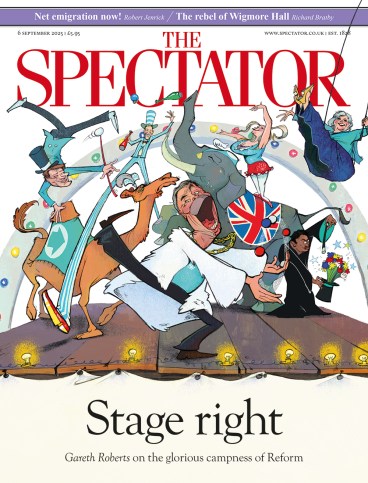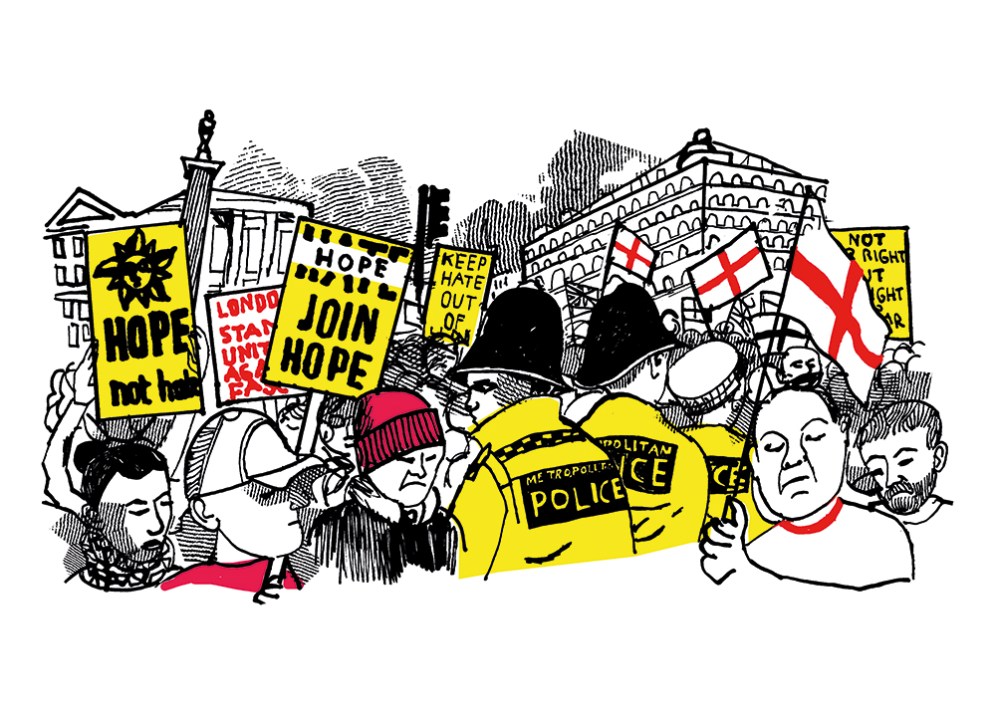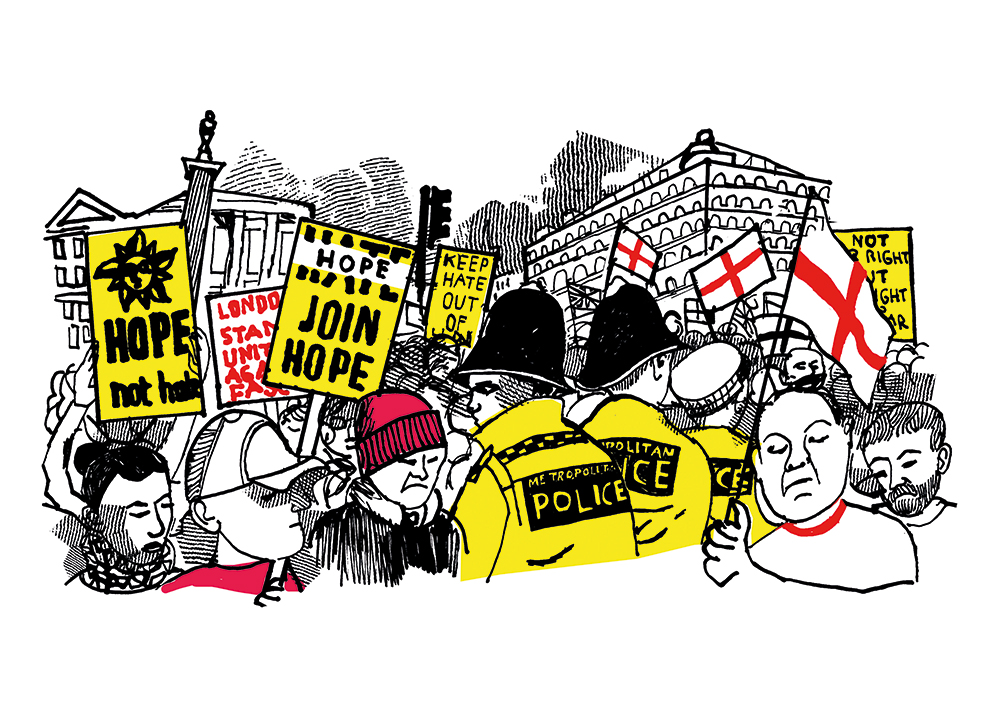
Simone Collins remembers the moment her guard came down. She was speaking to a polite, slightly self-effacing British man who had introduced himself, over email, as Christopher Morton, a wealthy philanthropist who was interested in donating to her charity, which promotes pronatalism. Pronatalism can be a controversial political cause, so Simone was understandably cautious that he might be too good to be true. To allay her fears, he sent her a photograph of a passport in that name. For Collins, it was proof that Morton was who he claimed to be.
Months later, she realised that ‘Christopher Morton’ was in fact Harry Shukman, a British journalist who had been working undercover for Hope Not Hate, an ‘anti-fascist’ organisation whose charitable arm has received funding from the British government. The passport, she says, was part of the ruse. We have seen the email and a picture of the document: a British passport bearing the name Christopher Charles Morton. The photo is of a man whose hairline, ears and facial structure match Shukman’s known images.
Shukman’s undercover work became a Guardian long-read and a Channel 4 documentary, and his book Year of the Rat was published by Penguin in May. Shukman describes a year spent infiltrating the ‘far-right’ using false identities. What neither the book, Channel 4 nor the Guardian article mentioned was the existence of the Christopher Morton passport.
That omission matters, because the use of such a document is not merely a journalistic parlour trick but may constitute a crime. Under the Identity Documents Act 2010, it is an offence to possess a false passport with ‘improper intention’, such as using it to establish an identity to another person. The maximum penalty is ten years.
Even without intention, possession without a ‘reasonable excuse’ carries a sentence of two years in jail. The Forgery and Counterfeiting Act 1981 makes it a further offence to use a false instrument intending it to be accepted as genuine to another’s prejudice. Neither law contains a defence of journalism in the public interest. If the Morton passport was fabricated and used in Britain, it places its holder on the wrong side of criminal statute.
The newspaper industry’s own codes set out when deception can be justified. Clause 10 of the Ipso Editors’ Code prohibits misrepresentation unless it is ‘justified in the public interest’, and the material cannot be obtained by other means. The Ofcom code says much the same for broadcasters. Undercover work has always carried risk: think of the classic exposés of abusive care homes or corrupt MPs. But those cases generally involved concealed cameras or pseudonyms, not sovereign identity documents. Falsifying a passport is qualitatively different. It is not simply a question of taste or editorial judgment but of criminal liability.
The group has repeatedly been involved in the use of strong-arm tactics to silence democratic dissent
That raises awkward questions for those who published Shukman’s work. The Guardian ran its long article by him on 24 April, despite being sent evidence that Shukman had used a fake passport in his investigation. A Guardian spokesperson said: ‘We are satisfied that our editorial processes were followed.’ Neither Penguin nor Channel 4 responded to our approach for comment.
Shukman’s work was supported throughout by Hope Not Hate. When approached for comment, they stated that they stand by the accuracy of Shukman’s investigation and described the allegation that he used a fake passport as ‘highly libellous’. Shukman was asked whether he had obtained or used any passport not issued to him, who created it, and whether his editors were aware. He did not respond to our approach for comment.
It is possible that the photograph we have seen is a doctored image of a real passport, meaning Shukman did not physically create a fake passport. But even with this provision, it is still illegal under the 2010 Identity Act to provide a document which ‘purports to be’ a United Kingdom passport, which would include a doctored image.
Another important question surrounds the police response, or lack thereof. In October last year, the broadcaster Connor Tomlinson reported Shukman’s fake passport to the Metropolitan Police. They have still failed to respond to his report. When a Freedom of Information request was made to the Home Office regarding Shukman’s actions, they refused on the grounds of section 31 of the Freedom of Information Act – which relates specifically to law enforcement. The Met had not responded to our approach for comment by the time of going to press.
Questions about Shukman’s methods extend beyond the passport. His reporting for Hope Not Hate included a series of highly questionable claims about the researcher Jonathan Anomaly, who runs a business genetically screening embryos. He said Anomaly’s work had been promoted by the Unz Review, an online publication edited by a Holocaust denier, at first without noting that it had in fact been republished without his permission. He stated that Anomaly had co-hosted live events for Aporia, which he describes as a ‘scientific racism website’ – Anomaly says this is false.
Both of these examples, taken individually, might be dismissed as carelessness. Taken together, they suggest a pattern of reporting that bolstered Shukman’s narrative at the expense of accuracy.
Its whole modus operandi is to seek to tarnish any robust challenge from the right as flirting with fascism
Returning to Simone Collins, to whom Shukman provided the fake passport – in his book, he begins his case against her by admitting that she publicly disavows racism, but tarnishes her by association with the far right by stating that she shares the view that falling birthrates are a problem – pointing to three different white nationalist terrorists who complained about the birthrate.
But any number of international institutions, from the IMF and the OECD to the World Health Organisation, have warned about the consequences of falling birthrates – as have the governments of nation states such as Japan. Would Shukman have put the late Japanese premier Shinzo Abe in the same category as the neo-Nazi mass murderer Brenton Tarrant, simply because both took an interest in demographic trends?
Hope Not Hate’s defenders like to frame it as a plucky anti-fascist outfit, but its methods are less valiant seeker after truth and more suppressor of voices of which it disapproves. The group has repeatedly been involved in the use of strong-arm tactics to silence democratic dissent. The Spectator columnist Douglas Murray was threatened by Hope Not Hate with inclusion on a hit list of ‘Islamophobes’ unless he retracted an article critical of the organisation – a stunt he likened to gangster blackmail.
Far from being an independent charity, Hope Not Hate, which was founded in 2004, has long operated in the slipstream of Labour politics. Its founder, Nick Lowles, campaigned alongside Morgan McSweeney, Downing Street’s chief of staff, in 2010.
After last year’s election, Lowles was invited into No. 10 to brief staffers on opinion evidence underpinning the rise of the far-right. This was not the visit of an independent polling expert sharing scientific findings, but another demonstration of Hope Not Hate’s intimate involvement with Labour. There is, however, no suggestion that McSweeney or anybody else within the party could have known about Shukman’s journalistic tactics in this specific incident.
Key Labour figures in the Commons are Hope Not Hate fellow travellers. Records from the registers of interests show that the director of communications for Hope Not Hate works for Margaret Mullane, who became a Labour MP for Barking and Dagenham last year. Gurinder Josan MP, Anna Turley MP and Sarah Owen MP have all held various positions within the organisation. Antonia Bance – also a 2024-intake MP – is listed as director of Hope Not Hate and also received funding of £7,500 from Labour Together in 2024, the thinktank created to help moderates reclaim the party in the Corbyn years.
Hope Not Hate’s latest campaign is overtly party political – it is called simply ‘Stop Reform UK’s Rise’. The Labour party is determined to brand Reform as unpatriotic and extreme – in line with Hope Not Hate’s campaign goals.
The group’s whole modus operandi is to seek to tarnish any robust challenge from the right as flirting with fascism. Its 2023 State of Hate report mixed neo-Nazis with mainstream Conservatives, blurring the line between violent extremists and ordinary Tories, lumping in elected MPs with proscribed terror groups.
Its record for accuracy is little better. During last year’s summer riots, Lowles told his tens of thousands of followers on X that acid had been thrown at a Muslim woman in Middlesbrough by far-right thugs. Police quickly confirmed that no such attack had taken place. Lowles apologised, but the damage had been done: the claim raced through social media and inflamed an already febrile atmosphere. Lowles, like Shukman, has faced no consequence for his actions.
Indeed the Home Office has given money directly to Hope Not Hate in the past. But far from inclining the organisation to tread more carefully, government support appears to have emboldened it to range further and more provocatively over time. The group’s methods have extended beyond Britain. Both Simone Collins and Jonathan Anomaly are American, and in targeting these individuals Hope Not Hate risked damaging their reputations and businesses. That a British organisation that has received funding from the government felt it was its duty to go after foreign citizens simply for holding potentially controversial views is novel to say the least.
It is hard to comprehend why the British government has funded an arms-length body that is dedicated to repressing controversial speech not only at home but abroad. With concerns about the erosion of free speech in the UK now more acute than ever, Hope Not Hate, its operating practices and the institutions that continue to publish its work deserve far more scrutiny than they have so far received.









Comments